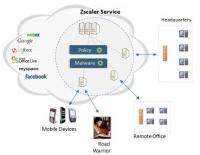-
Paris terrorist attacks reignite debate over end-to-end encryption, back doors
The exact way the terrorists who attacked France last Friday communicated with each other, and their handlers, in the run-up to the attack is not yet clear, but the attack has prompted law enforcement and intelligence agencies in Europe and the United States to renew their call to regulate the use of new encryption technologies which allow users to “go dark” and make it difficult, if not altogether impossible, to retrieve the contents of communication.
-
-
Global climate finance increases to $391 billion
A new report about the world’s inventory of climate finance shows that more money than ever before — at least $391 billion — was invested in low-carbon and climate-resilient actions in 2014. Private actors invested $243 billion in renewable energies, a surge of 26 percent from 2013, which resulted in record solar PV and onshore wind deployment. Public finance reached at least $148 billion continuing its steady growth over the past three years. Also, 74 percent of total climate finance ($290 billion) and 92 percent ($222 billion) of private investment was raised and spent in the same country. The domestic preference of climate finance highlights the importance of domestic investment policy and support frameworks.
-
-
Investment portfolios may take short-term hits as a result of climate change sentiment
A new report reveals that global investment portfolios could lose up to 45 percent as a consequence of short-term shifts in climate change sentiment. The report concluded that about half of this potential loss could be avoided through portfolio reallocation, while the other half is “unhedgeable,” meaning that investors cannot necessarily protect themselves from losses unless action on climate change is taken at a system level.
-
-
Finnish company to construct final disposal facility of spent nuclear fuel

The Finnish government has granted a license to Finnish company Posiva for the construction of a final disposal facility for spent nuclear fuel. The spent fuel assemblies will be encapsulated and placed in the bedrock at a depth of about 400 meters for permanent disposal. The waste will be stored for around 100,000 years before its level of radioactivity begins to dissipate. “This is the world’s first authorization for the final repository of used nuclear waste,” Finland’s Economy Minister Olli Rehn said.
-
-
Oklahoma Corporation Commission shuts down oil wells to reduce threat to Cushing oil hub

Cushing, Oklahoma, is the site of an immense oil tank farm, which presently stores fifty-four million barrels awaiting transfer to coastal refineries and plants. The tank farm is considered an integral and vital part of our national energy infrastructure. According to scientists, the integrity of the Cushing hub is now at risk because of fracking. Studies document that the recent disposal of millions of barrels of water into disposal wells, including those adjacent to the Cushing hub, have caused the rapid rise of earthquakes in Oklahoma. Oklahoma earthquakes have thus become a very real national security issue. Until federal expertise and support reaches Oklahoma, a potential human-made catastrophe could conceivably also become a national security disaster.
-
-
In the world of finance, consideration of climate change is now mainstream
As climate changes become impossible to dismiss, how does the mainstream investor community respond? Are financial decisions taking full account of risks and opportunities related to climate change, or is the topic still virtually ignored in financial decision-making?
-
-
In our Wi-Fi world, the internet still depends on undersea cables
Not many people realize that undersea cables transport nearly 100 percent of transoceanic data traffic. These lines are laid on the very bottom of the ocean floor. They’re about as thick as a garden hose and carry the world’s Internet, phone calls and even TV transmissions between continents at the speed of light. A single cable can carry tens of terabits of information per second. The cables we all rely on to send everything from e-mail to banking information across the seas remain largely unregulated and undefended. Any single cable line has been and will continue to be susceptible to disruption. And the only way around this is to build a more diverse system, because the thing that protects global information traffic is the fact that there’s some redundancy built into the system. But as things are, even though individual companies each look out for their own network, there is no economic incentive or supervisory body to ensure the global system as a whole is resilient. If there’s a vulnerability to worry about, this is it.
-
-
Leading tech companies get failing grade for their privacy policies
The Ranking Digital Rights’ report, 2015 Corporate Accountability Index, find that the world’s leading technology companies deserve a failing grade for their privacy policies and the level of protection they offer their users. Some of the companies have also been found lacking for their freedom of expression practices. “Even the companies that ranked highest are missing the mark in some ways, and improvements are needed across the board to demonstrate a greater commitment to users’ freedom of expression and privacy,” the report says.
-
-
Stealing encryption keys on Amazon’s Cloud servers

Cloud computing is a service that enables companies and organizations to store information and run computer applications without making their own investments in actual computer hardware or employing IT staff. Researchers have demonstrated that RSA encryption keys, which are used by thousands of companies and organizations to protect the data and processes they entrust to cloud-based services, can be obtained using a sophisticated side-channel attack — despite recent efforts by cloud service providers and cryptography software developers to eliminate such vulnerabilities.
-
-
Search in Illinois, Indiana for missing canister holding radioactive materials
Teams from the Illinois Emergency Management Agency (IEMA) are continuing their search in Illinois and neighboring Indiana for a missing steel canister containing radioactive material. The locked steel canister was last believed to be in a custom oil well logging truck. The nuclear material was used by an Illinois company specializing in surveying oil wells.
-
-
Amendment to CISA: U.S. courts could pursue foreigners for crimes abroad against other foreigners
A controversial amendment to an already-controversial cybersecurity bill will allow U.S. courts to pursue, convict, and jail foreign nationals in cases in which these foreigners committed crimes against other foreigners on foreign soil. The amendment to the Cybersecurity Information Sharing Act (CISA) cleared a key Senate hurdle on Thursday. It aims to lower the barrier for prosecuting crimes committed abroad.
-
-
EFF leads privacy advocates in opposing CISA
Privacy advocates have intensified their campaign against the Cybersecurity Information Sharing Act (CISA), which the Senate will vote on sometime next week. The Electronic Frontier Foundation (EFF) says it vehemently opposes the bill, as well as amendments which would expand the Computer Fraud and Abuse Act. EFF says that CISA is fundamentally flawed. The bill’s broad immunity clauses, vague definitions, and what EFF describes as “aggressive spying powers” combine to “make the bill a surveillance bill in disguise.”
-
-
Ruling shows Europe still vexed over NSA spying, leaving U.S. companies in legal limbo
For over fifteen years, the Data Transfer Pact between the European Union and the United States, more commonly known as Safe Harbor, had ensured that companies with EU operations could transfer online data about their employees and customers back to the United States despite stark differences between U.S. and European privacy law. Earlier this month, U.S. companies operating in Europe got some unwelcome news: Safe Harbor had been ruled invalid. The European court’s ruling has serious implications for these companies’ business models and profitability, leaving many scrambling to find solutions. But it also exposes a fundamental cultural rift between the U.S. and Europe’s conceptions of privacy – one that a new agreement won’t be able to paper over.
-
-
New tool allows users to see how their personal information is used on the Web
Navigating the Web gets easier by the day as corporate monitoring of our e-mails and browsing habits fine-tune the algorithms that serve us personalized ads and recommendations. But convenience comes at a cost. In the wrong hands, our personal information can be used against us, to discriminate on housing and health insurance, and overcharge on goods and services, among other risks. “The Web is like the Wild West,” says one researcher. “There’s no oversight of how our data are being collected, exchanged and used.”
-
-
Climate change will reshape global economy: Study
Unmitigated climate change is likely to reduce the income of an average person on Earth by roughly 23 percent in 2100, according to estimates contained in a new study. The findings indicate climate change will widen global inequality, perhaps dramatically, because warming is good for cold countries, which tend to be richer, and more harmful for hot countries, which tend to be poorer. In the researchers’ benchmark estimate, climate change will reduce average income in the poorest 40 percent of countries by 75 percent in 2100, while the richest 20 percent may experience slight gains.
-
More headlines
The long view
Factories First: Winning the Drone War Before It Starts
Wars are won by factories before they are won on the battlefield,Martin C. Feldmann writes, noting that the United States lacks the manufacturing depth for the coming drone age. Rectifying this situation “will take far more than procurement tweaks,” Feldmann writes. “It demands a national-level, wartime-scale industrial mobilization.”
Trump Is Fast-Tracking New Coal Mines — Even When They Don’t Make Economic Sense
In Appalachian Tennessee, mines shut down and couldn’t pay their debts. Now a new one is opening under the guise of an “energy emergency.”
Smaller Nuclear Reactors Spark Renewed Interest in a Once-Shunned Energy Source
In the past two years, half the states have taken action to promote nuclear power, from creating nuclear task forces to integrating nuclear into long-term energy plans.
